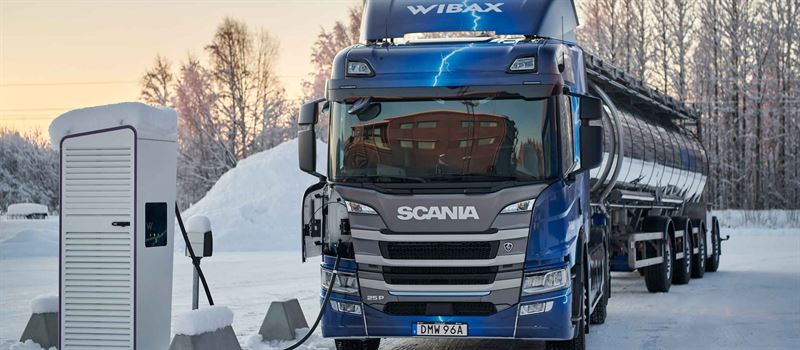Scania 64-tonne electric truck on the road with Wibax

A 64-tonne electric truck has been delivered to chemical supplier Wibax and will operate on the roads of northern Sweden. The 3-axle electric tractor contributes to Wibax reaching its climate targets and is yet another example of Scania innovating in close partnership with a customer.
Electrified heavy transport is already happening. This is something that Scania and Wibax show with this new vehicle which runs solely on electricity. The electric truck has a total weight of 64 tonnes, including load and trailer, and will run on the roads between the cities of Piteå and Skellefteå in northern Sweden, a distance of 80 kilometres one way.
The vehicle’s performance and load capacity are made possible by the development of a significantly stronger electric motor. As part of a long-term partnership, Scania and Wibax will work together to optimise the use of the vehicle over time – including charging, battery life length and route planning. This will also provide valuable insights to Wibax as they prepare to add additional electric vehicles to their fleet in the future.
For Wibax, the Scania electric truck is a way to reduce the climate impact from its operations.
“We have done our utmost to be sustainable since the company was founded in 1986, and as we have identified transports as our biggest environmental impact, this electric truck is a step to ensure we can carry on with our operations with the climate in mind. During the lifetime of this truck, Wibax will reduce CO2 emissions by up to 1,400 tonnes, making it a true game-changer,” says Jonas Wiklund, CEO of Wibax Group.
Scania and Wibax have a close collaboration to enable this electrified solution.
“This is the first fully electric 64-tonner that we put on the road in customer operations. Step by step, we are demonstrating that electric solutions are happening very fast and for basically all segments,” says Fredrik Allard, Head of E-mobility, Scania.
The continued and rapid development puts further focus on the need for infrastructure and green electricity also outside the urban areas. Steps are being taken but more speed is needed. In this case, the power company Skellefteå Kraft has been involved and is delivering the charging infrastructure.
“It is vital for us to be at the forefront in sustainability matters. It shouldn’t just be something you read on a piece of paper; it should mean something for real. Lighter electrified trucks have been available on the market for a while, but for us, it only really matters now when we are able to electrify our 64-tonne loads. Our values are ‘great chemistry’ and this investment is in line with that motto. These issues have been on the table for long, but now we see that the demand for sustainable solutions from the market increases. This is beginning to happen for real,” says Wiklund.
Download video material here (free of use, for editing purposes only)
For further information, please contact:
Karin Hallstan, Head of Corporate Communications, Scania
Phone: +46 76 842 81 04
E-mail: karin.hallstan@scania.com
Scania is a world-leading provider of transport solutions. Together with our partners and customers we are driving the shift towards a sustainable transport system. In 2020, we delivered 66,900 trucks, 5,200 buses as well as 11,000 industrial and marine power systems to our customers. Net sales totalled to over SEK 125 billion, of which over 20 percent were services-related. Founded in 1891, Scania now operates in more than 100 countries and employs some 50,000 people. Research and development are mainly concentrated in Sweden. Production takes place in Europe and Latin America with regional product centres in Africa, Asia and Eurasia. Scania is part of TRATON GROUP. For more information visit: www.scania.com.


